New Ohio State AD Ross Bjork faced accusations of lying about former Ole Miss coach
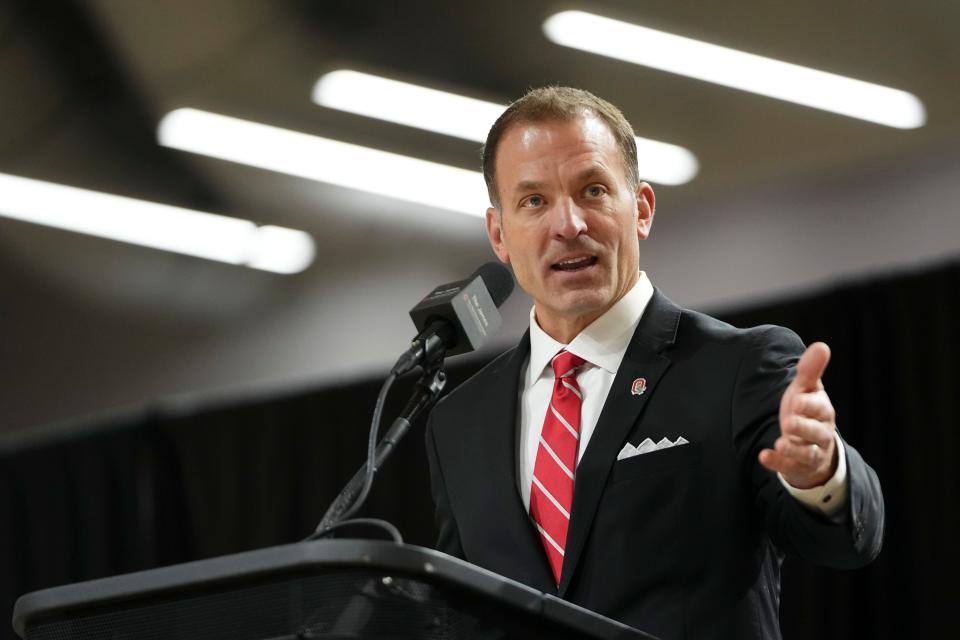
All Houston Nutt wanted was an apology.
Nutt was working for CBS Sports in 2016 when he kept seeing his name linked to serious NCAA violations from his time as football coach at the University of Mississippi.
Ole Miss had fired Nutt five years earlier. He had no idea who was spreading what he considered to be false information, but it was pervasive. After even his own mother questioned him during his visit in Little Rock, Arkansas, Nutt decided to act.
“When your mom says, ‘Do you have Level 1 violations?’’ Nutt told The Dispatch. “That’s what hurts the most because you always tried to do it the right way for my 30 years of coaching, especially as a head coach, and that was bothersome.”
MORE: A timeline of OSU AD Ross Bjork's handling of NCAA violations when he was at Ole Miss
Nutt knew a pastor in Little Rock who was friends with attorney Tom Mars. Mars started digging and was amazed by what he found.
He became convinced that Ole Miss had orchestrated what he called a smear campaign against his client and eventually filed a lawsuit alleging so. One of the central figures in that effort, Mars believed, was Ole Miss athletic director Ross Bjork, Ohio State's incoming athletic director.
During Bjork’s seven-year tenure, the NCAA would twice find Ole Miss guilty of violations and place the school on probation. Nutt’s lawsuit — Bjork was not a defendant — was settled faster after its filing than any litigation he's ever handled, Mars said.
On Jan. 16, Bjork was named to succeed retiring Gene Smith as Ohio State’s athletic director. Eyebrows were raised across the country that new OSU president Ted Carter made Bjork his first major hire.
It wasn’t just that OSU didn’t choose one of the several candidates who had worked under Smith at Ohio State. It was that Bjork had been embroiled in controversies both at Ole Miss and then at Texas A&M, from where he was leaving to go to OSU. The biggest one at Texas A&M involved his decision to extend football coach Jimbo Fisher's contract, a move that backfired because it cost the university a historically high $77 million when he was fired last year.
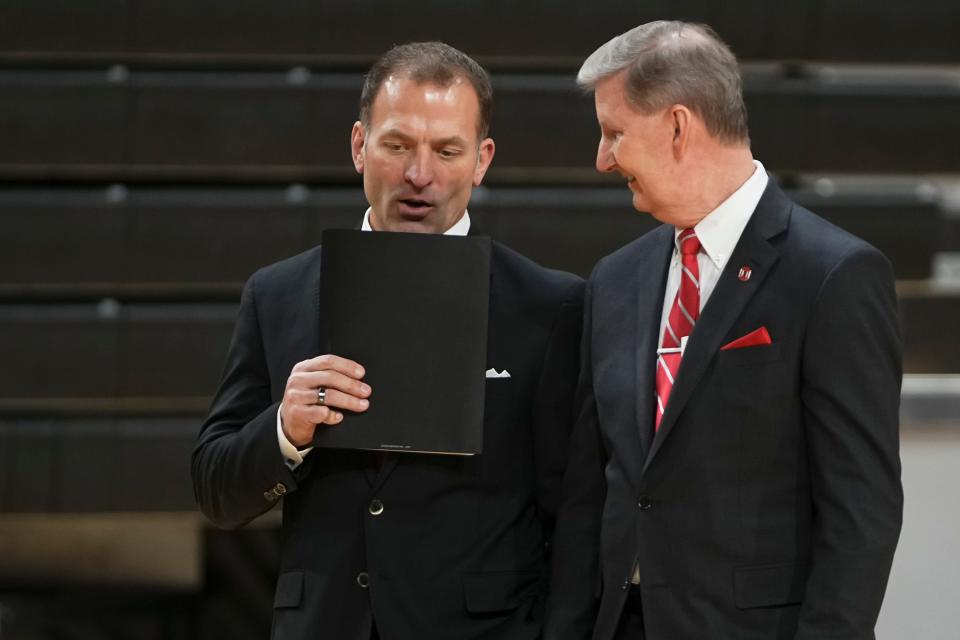
During Ohio State's news conference to introduce Bjork, Carter referenced the controversies.
“A calm sea never produced a good sailor,” said Carter, a retired United States Navy vice admiral.
Bjork certainly has navigated choppy waters, but the question is how much he helped cause them. In an interview with The Dispatch, Bjork defended his actions at Ole Miss.
“Throughout my career, when made aware of potential NCAA violations, I have always acted transparently, honestly and with a focus on supporting our student-athletes and doing the right thing,” Bjork said. “I did so at Mississippi and will do the same at Ohio State.”
The Ohio State Board of Trustees still has to approve Bjork's hiring at its next scheduled meeting on Thursday, Feb. 22.
Journalists feel they were misled by Mississippi, Ross Bjork
Mars has become known as one of the most powerful attorneys in college sports. He was Justin Fields’ lawyer when the quarterback successfully lobbied for immediate eligibility following his transfer from Georgia to Ohio State five years ago when NCAA rules generally required athletes switching schools to sit out a year.
But until Nutt hired him, college sports was new territory for him. Even when he took the case, he was skeptical.
“I left that meeting thinking to myself, ‘This can't be true. No flagship university would orchestrate a smear campaign to this degree for that purpose,’” Mars said.
He told Nutt he needed about 10 days to investigate.
“The more I looked, the more I started to believe that this probably did happen,” Mars said.
Mars spoke with journalists who had been covering the story. The first was Pat Forde, then at Yahoo Sports and now at Sports Illustrated. Forde had talked with Bjork in 2014 for a story on the resurgence of both the Ole Miss and Mississippi State football programs. But Forde had also learned of the potential NCAA violations and asked Bjork about them.
“I don’t remember the exact specifics of the conversation,” Forde said, “but there was no doubt that it was at least portrayed that this was a Houston Nutt problem, this was a track and field and women’s basketball problem. This was not a Hugh Freeze and (current) football problem.
“That didn’t jibe with what I had been told beforehand. But we didn’t have access to any of the documents.”
After talking with Forde and other reporters, Mars reached out to Ole Miss’s general counsel, Lee Tyner.
“He was very dismissive and basically treated me like I didn’t know what I was talking about and that I was just an annoyance,’ Mars recalled.
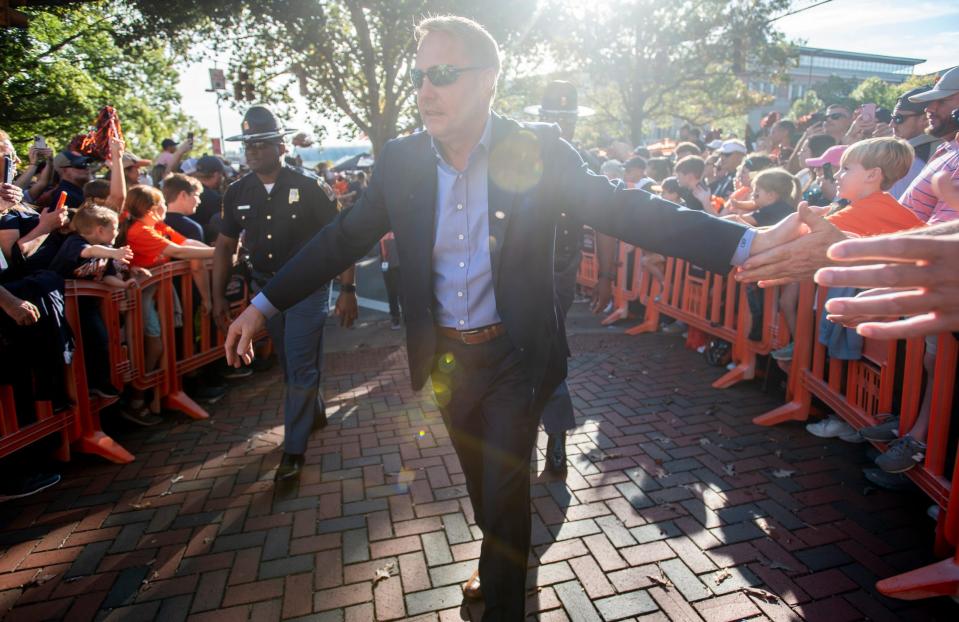
Ole Miss faced important football National Signing Day
Mars then submitted Freedom of Information Act requests to Ole Miss to get its internal records, including phone logs.
On Jan. 22, 2016, the NCAA issued a Notice of Allegations, with most of the charges pinned on Freeze and his staff. The Notice of Allegations was delivered to Ole Miss’s outside counsel instead of the chancellor, keeping it from being subject to public records requests until the university released it months later.
But there was still plenty of smoke swirling around the program as the February signing day approached. Mississippi football has almost always been in the shadow of Alabama and Louisiana State in the Southeastern Conference. Its rivalry with Mississippi State is heated, with each eager to charge the other with cheating.
But in 2016, Ole Miss was on the verge of signing a banner class that would rank fifth nationally in the 247Sports composite rankings, the best in school history. To have stories surface that Freeze and his staff were facing major violations might decimate the recruiting class.
According to Mars and several reporters and parents of recruits, Ole Miss orchestrated a plan to say that the bulk of what the NCAA was investigating took place under Nutt, not Freeze.
“As I reflect on what Ole Miss did to Houston Nutt, I know firsthand for certain that Ross Bjork was aware of what they did, and how they did it,” Mars said. “What I don't know is what direction he might have had from the president or the board of trustees or the infamous Ole Miss boosters.
“If he had any pressure from any of those directions, I'm sure it was immense. And while I don't think that excuses what Ole Miss did to Houston Nutt, which was really unforgivable, I can't identify one particular person that I would singularly blame for what they did.”
Others were more willing to say it was Bjork who directed the message.
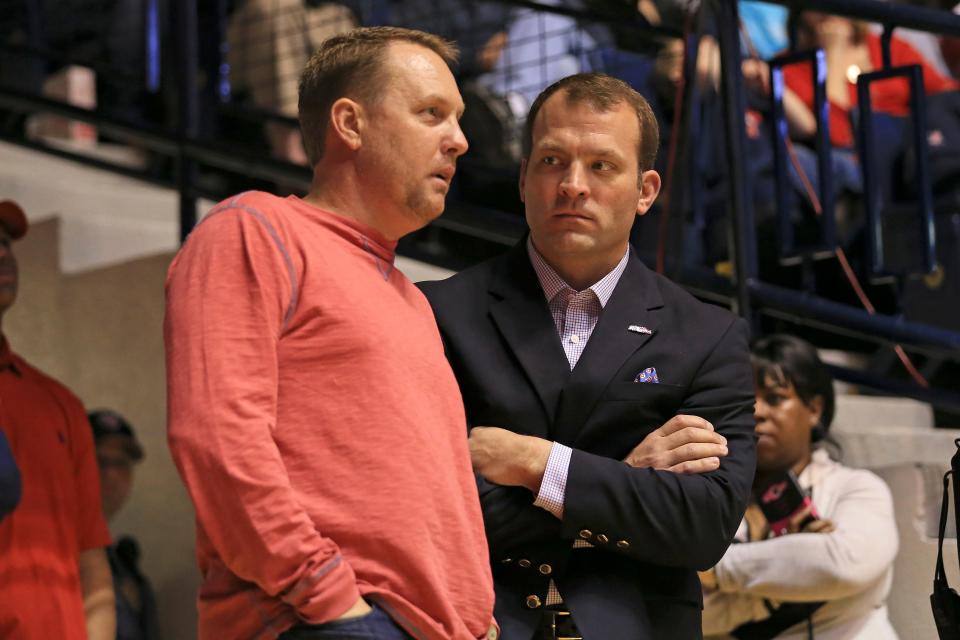
Shea Patterson's father says 'Everything was driving from the top' at Ole Miss
Sean Patterson is the father of quarterback Shea Patterson, who was the top-ranked recruit in that class, and of Sean Jr., who then worked in the Ole Miss recruiting department. Shea Patterson would later transfer to Michigan.
“The message was that nothing happened under this staff. It all happened under Houston Nutt’s staff,” Sean Patterson said. “I think everything was driving from the top on what the company word was to say.”
The top, he said, was Bjork.
Deontay Anderson was another highly rated recruit in 2016.
“We questioned them — him (Bjork) and Hugh Freeze,” Anderson’s father, Mike, said. “’Was everything going to be straightened out?’ They promised us, ‘No problem.’”
Bjork denies that he misled recruits or directed anyone on his staff to do so. He said he made no distinction between alleged violations that occurred under Nutt or Freeze.
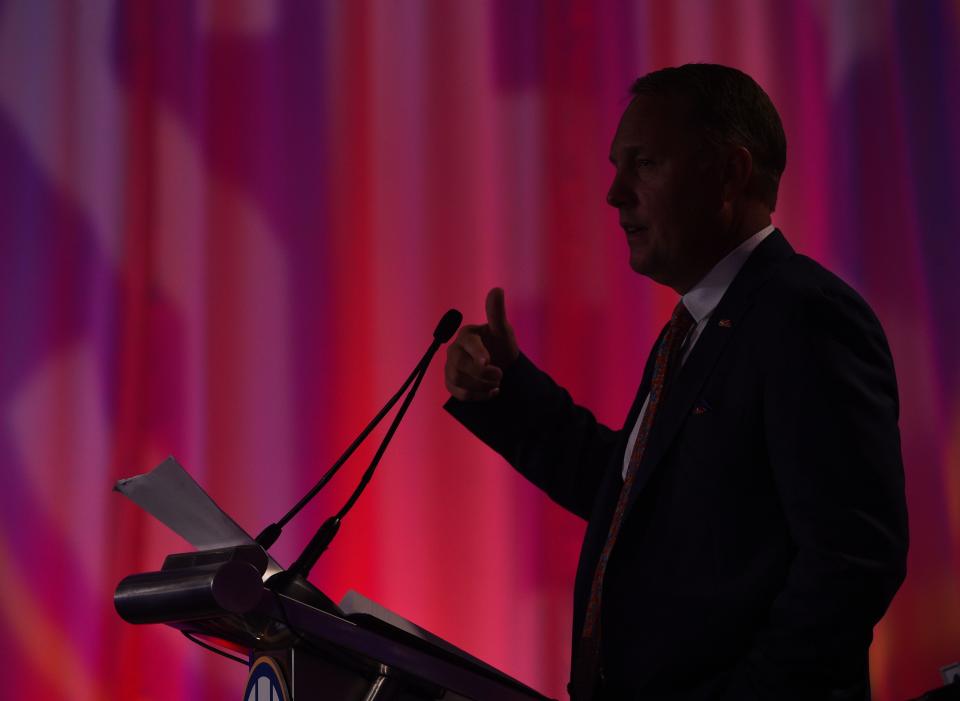
“I wasn’t part of any orchestrated campaign,” Bjork said. “Our football coach at that time was just in a world of pressure, if you will, and so I don’t know what he was saying to people. I saw the reports just like you did. I also saw reports that said there were a lot of (violations) under Hugh Freeze.
“We were very transparent with every recruit and every family during that process based on what we knew at the time.”
Dr. Jeffrey Vitter, who was the Ole Miss chancellor at the time, said Bjork handled the matter appropriately.
"I have no reason to think that Ross was involved in any kind of devious strategy," he said. "Ross is not the person who would do that sort of thing, and I certainly was never aware of any inclination on his part about that."
Freeze, now the coach at Auburn, declined to comment for this story, a school spokeswoman said.
On signing day, when Ole Miss’s recruiting class held together, Freeze took umbrage at those who claimed the school was cheating.
“If you have facts about a violation,” Freeze wrote on Twitter, “send it to compliance@olemiss.edu. If not, please do not slander these young men or insult their family.”
Despite Freeze’s bravado, the truth eventually would come out. On May 27, Ole Miss released the Notice of Allegations. It revealed that nine of the 13 allegations leveled against the football program occurred under Freeze instead of Nutt, including four Level 1 violations, the most serious type. Of the four that happened under Nutt, he was not accused of wrongdoing.
Reporters who believed they were duped months earlier were furious.
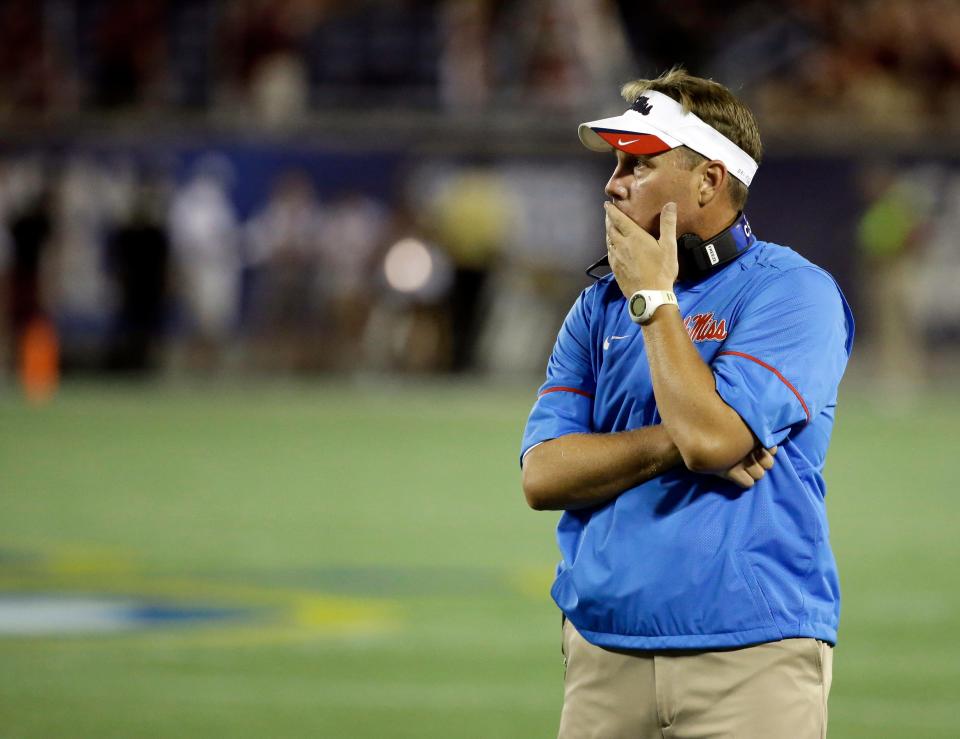
“I think there was a genuine shock and disgust from the entire media that covered that saga that we would be so purposefully misled,” said Steven Godfrey, then with Vox and now the Washington Post. “It's not that I didn't think those people had it in them. It's that there's no way they get away with it. They were going to be found out like months later.”
Godfrey said he has no doubt that Bjork was involved in the effort to mislead reporters and recruits.
“Yes, I believe Ross Bjork was knowledgeable of and helping to perpetuate a disinformation campaign,” he said, also mentioning two other Ole Miss officials.
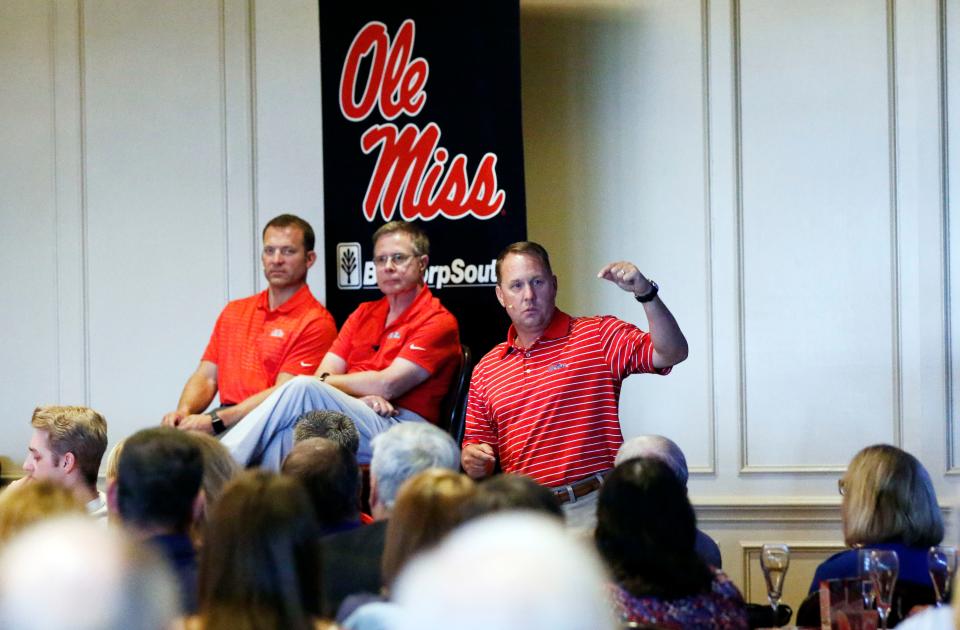
More trouble for Ole Miss football
Ole Miss’s NCAA troubles would get worse. The big story of the 2016 NFL draft that April was a hacked video of star Ole Miss offensive tackle Laremy Tunsil smoking from a bong while wearing a gas mask. In a leaked text exchange, Tunsil asked an Ole Miss staffer for money. That prompted the NCAA to open another investigation.
The new investigation was contentious. Ole Miss officials believed the NCAA conducted it contrary to its stated guidelines of transparency. At a news conference, an angry Bjork said, “The entire conduct went from one of cooperation to one where we were shut out.”
The NCAA’s Notice of Allegations issued in 2017 charged Ole Miss with 21 additional violations. The school imposed a bowl ban for that season in hopes of heading off harsher penalties.
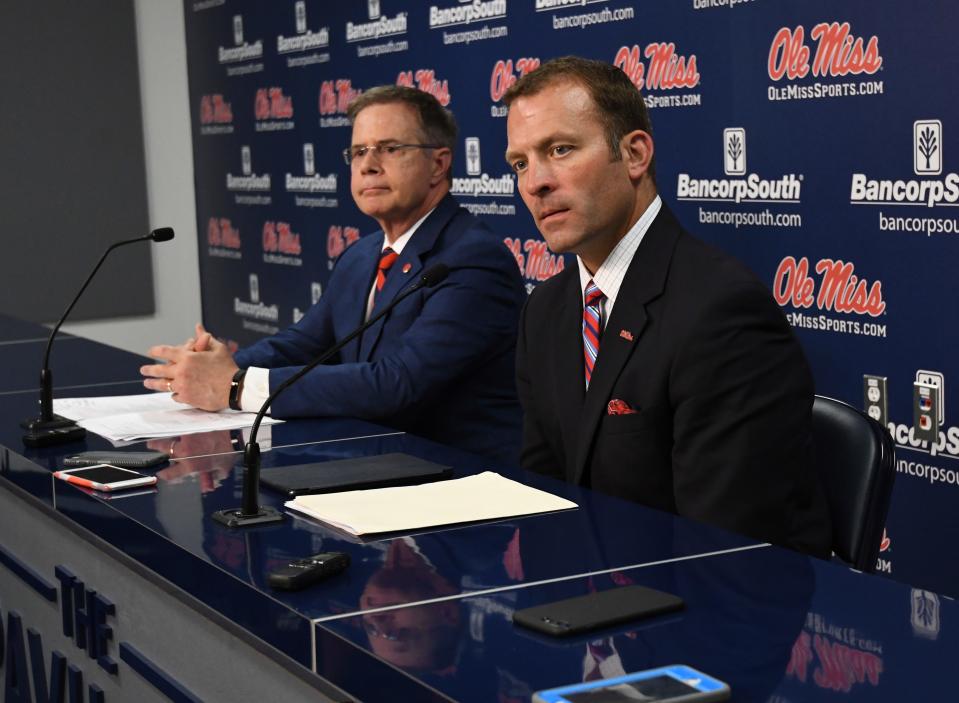
Ole Miss fired Freeze in July, but not because of the NCAA investigation. Mars’ research uncovered evidence that Freeze had made at least 12 phone calls to escort services. That became the grounds for his dismissal.
In July 2017, Nutt filed a federal lawsuit against the Ole Miss Athletics Foundation, the University of Mississippi and the board of trustees for institutions of higher learning. In the 46-page lawsuit, which was eventually refiled in circuit court, Bjork’s name appears 200 times. Many of the mentions are innocuous, but others show that he made many more phone calls to Freeze, other football staffers and reporters around signing day than he typically did. Only the length of the calls could be determined, not the subject matters.
Mars said that Ole Miss’s outside attorney had told him before the lawsuit was filed that the university would never settle it out of court.
“Within I believe six hours of filing that state court lawsuit with the incredibly detailed facts in that complaint, that same lawyer called us and said the university wanted to settle the case,” Mars said. “They did the paperwork and accomplished the settlement in a matter of three to four days. Therefore, nobody associated with the University of Mississippi had to answer that complaint or comment on it, and they never did.
“In the 37 years I’ve been a lawyer, most of which has involved being a trial lawyer, I’ve never seen a case settled that quickly. I can’t even think of a close second.”
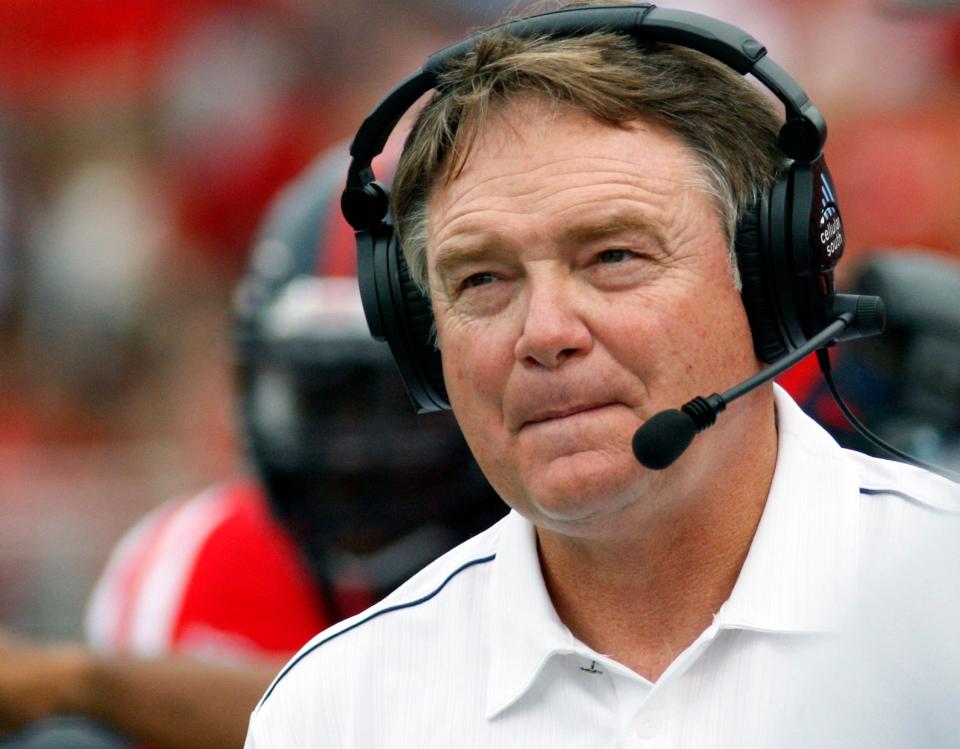
Nutt, who's now retired, got the apology that he wanted from the start.
This was the university's apology:
"Certain statements made by University employees in January 2016 appear to have contributed to misleading media reports about Coach Nutt. To the extent any such statement harmed Coach Nutt's reputation, the University apologizes, as this was not the intent. The NCAA's Notice of Allegations dated January 22, 2016, did not name or implicate Coach Nutt in any misconduct, and it would have been inappropriate for a University employee to suggest otherwise."
Vitter, the former chancellor, said the case was settled because the school's focus was on the NCAA investigation. Bjork declined to comment specifically about the settlement with Nutt, other than to say in a statement, “At the time, the University of Mississippi issued a clarifying statement, and we wished Houston Nutt the best.”
In 2018, the NCAA issued additional penalties to Ole Miss based on the second NOA. Some were overturned on appeal.
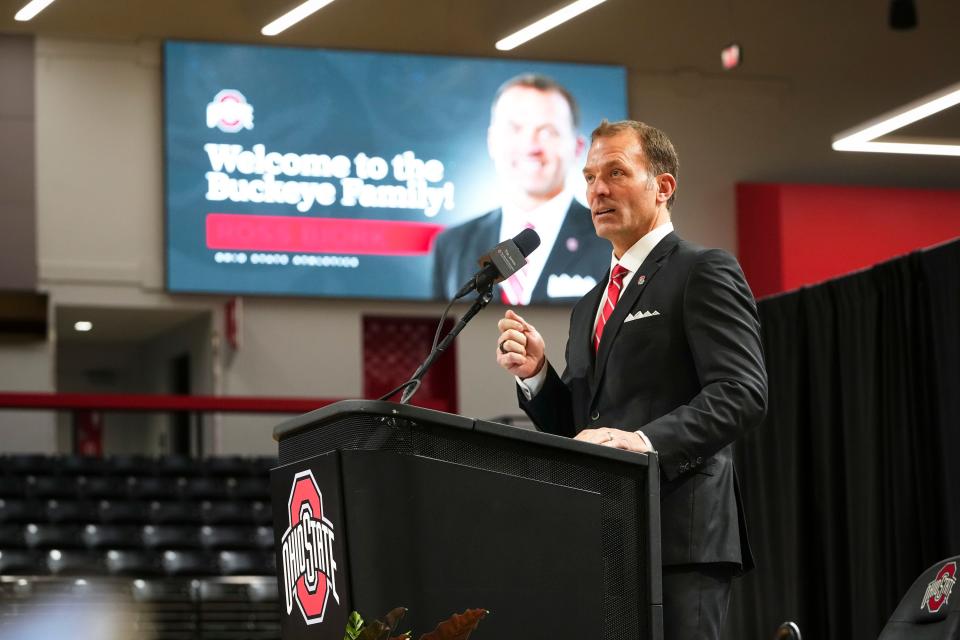
Ross Bjork says Ohio State was 'thorough' in interviews
In 2019, Texas A&M hired Bjork as its athletic director. He was in College Station, Texas, for five years before Ohio State hired him.
“We talked about a lot of things, (my) history, (my) background,” Bjork said. “President Carter was very thorough in his questions, and we had great dialogue the several times that we met. We definitely talked about a lot of things, including past history and past leadership moments, something like this (Ole Miss case) as well.”
According to a statement by Ohio State, Carter and the search committee in charge of researching candidates were aware of the Houston Nutt lawsuit.
“As with any executive candidate, the search firm, search committee, and university administrators thoroughly vetted the candidate, conducted background checks, and spoke with numerous references,” the university said.
Bjork, whose only other athletic director job was at Western Kentucky for two years, did not have any experience as an athletic director with a major NCAA investigation until he got to Ole Miss.
“Going through all of this, there's nothing that can surprise me anymore,” Bjork said. “There's no leadership moment in college athletics that maybe I haven't seen already, so I think I'm better equipped moving forward having gone through this.
“I don't like going through it. Nobody likes going through a seven-year process. … But I'm definitely better equipped for having gone through it. Now I know, look, this is how you deal with things: You hit it head-on. You don't ever try to sugarcoat anything. It's just straightforward. Those are things that you take away, and you just hope it never happens again, knock on wood.”
This article originally appeared on The Columbus Dispatch: The story of new Ohio State AD Ross Bjork's tough times at Ole Miss
